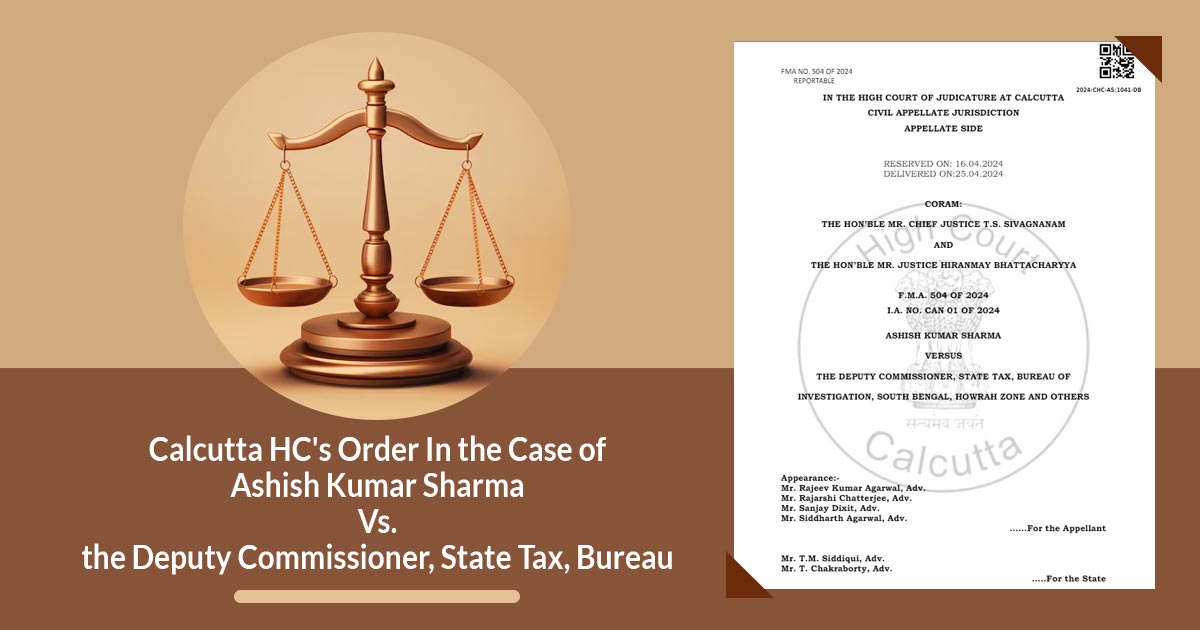
The Calcutta High Court ruled that the GST department could not calculate the penalty amount on a higher value compared to the invoice value without proper proof and reason.
The bench of Chief Justice T.S. Sivagnanam and Justice Hiranmay Bhattacharyya has marked that a transporter or owner of the goods is forced to carry specific documents as cited in the Act that are to accompany the goods. In the matter, a GST e-way bill was generated before the movement of the goods, in which the tax invoice number was duly incorporated. Tax payment evidence ought to have been established, and the e-way bill was valid till September 5, 2022. The appellant’s mistake was not extending the e-way bill after its expiration, even after such privilege was authorized under the Rules.
As per the provisions of the West Bengal Goods and Services Tax Act, 2017, the applicant has contested an order passed by the appellate authority. The appellate authority had dismissed the petition that the appellant had furnished contesting the order passed via the adjudicating authority charging a penalty on the appellant on the basis that the e-way bill generated by the appellant had lapsed at the time when the vehicle was seized, four days had expired.
During its journey, the vehicle suffered breakdowns, and on the date, the vehicle was intercepted dated 10.09.2022, the e-way bill generated by the appellant dated 02.09.2022 had expired and 4 days had lapsed after that. The authority who detained the vehicle, namely the State Tax Officer, Bureau of Investigation (South Bengal) Howrah Zone, while ordering for physical verification or inspection of conveyance goods and documents in Form GST MOV-02, remarked that the inspection is needed to be undergone as per Section 68(3) of the WBGST Act read with the CGST Act, 2017 or u/s 20 of the IGST Act for the reason that the e-way bill lapsed for more than 4 days.
U/s 129(1) an order of detention has been passed by the Deputy Commissioner for the lapse of the e-way bill for exceeding 4 days. Under Section 129(3) of the Act SCN was issued asking to charge a 200% penalty because the e-way had lapsed for more than 4 days and the vehicle was moving with the loaded consignment without an e-way bill.
The appeal has been rejected by the appellate authority on the foundation that the appellant is not able to produce any documentary proof to explain their efforts to extend the validity of the e-way bill.
It is argued by the department that the provisions must not be generated redundant and certain that does not include must not be read into statute, and the matter is a breach of the rules in as much as the vehicle. On the interception, does not have a valid e-way bill, which is a legal requirement, and consequence in levying a penalty. To extend or revalidate the e-way bill no effort is been taken, and the appellant along with the transporter is aware of the process. These e-way bill extension bills can be received via mobile phone.
Read Also: Calcutta HC: No Pending Payable Taxes, Won’t Get Punished U/S 129 of the GST Act
The taxpayer mentioned that it has been discovered guilty of not producing documentary evidence to verify their stand; except for the receipt payment for engaging services of a crane, No other document is been furnished by the appellant. Nothing on record is there to indicate that there was an intent to evade the tax payment.
The court remarked that the matter can be understood to be rather strange, and levying a 200% penalty is brutal, and when it is to be affirmed, it shall cause serious prejudice to the appellant. As the appellant had not been engaged in validating the e-way bill for 4 days, he could not be wholly forgiven. No doubt is there that the statute provides for the levying of a 200% penalty.
The court ruled that the appellant is accountable for filing Rs. 1,00,000/-. The same amount will be retained from and out of the total amount filed via the appellant, and the balance will be refunded to the appellant within 3 months.
| Case Title | Ashish Kumar Sharma vs. the Deputy Commissioner, State Tax, Bureau |
| Case No.: | F.M.A. 504 OF 2024, I.A. NO. CAN 01 OF 2024 |
| Date | 25.04.2024 |
| Counsel For Petitioner | Mr Rajeev Kumar Agarwal, Mr. Rajarshi Chatterjee, Mr. Sanjay Dixit, Mr Siddharth Agarwal |
| Counsel For Respondent | Mr T.M. Siddiqui, Mr T. Chakraborty |
| Calcutta High Court | Read Order |